Contents
Almost any summer resident has at least a small plot of land allocated for strawberry bushes. But not every gardener can boast of really tasty, fragrant berries and an excellent harvest. Growing strawberries outdoors is just growing strawberries in your garden. Under open ground is meant a bed that is not protected by a greenhouse. Such cultivation has its secrets.
Tips for beginners
Many attempts by novice gardeners to get a good strawberry crop in their area lead to very average results – the berries grow watery, sour, and rotten. A lot of work has been invested in the strawberry garden. But do not despair and give up. The very first step is to decide what the bed should be. It is the wrong choice of location that often causes failure.
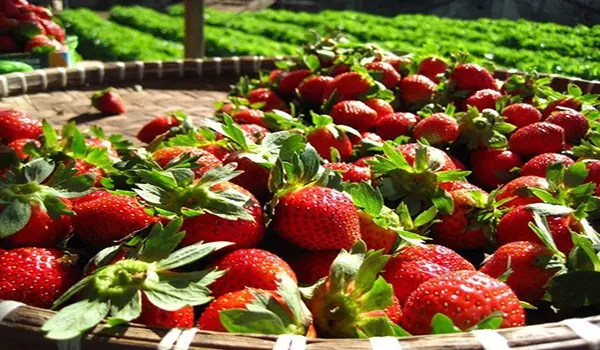
- The bed should be located on a site that is protected from the wind, which in winter is covered with a layer of snow at least 20-30 centimeters. The site should be well lit, as there will be no crop in the shade.
- The soil surface should be flat or have a slight slope to the southwest.
- Lowlands are not suitable for planting: cold air accumulates in such places, plants will get sick, and the harvest will be late.
- The southern slope is also not suitable for the beds: the snow melts too early and the bushes remain defenseless against frost.
- To prevent fungal and viral diseases of plants, be sure to change the place of cultivation every four, or even better two years.
- It must be remembered: the more often the plants are planted, the smaller the berries will be (when harvesting this is a clear disadvantage). To avoid this, the distance between the bushes should be about half a meter.
- The bed should not be waterlogged, but the lack of moisture is also detrimental.
Preparing the site for cultivation
You can grow strawberries (or strawberries) in any soil, it is quite unpretentious and not too demanding. But the bushes feel especially good on black soil with the addition of ash. But the peat components of the soil are not recommended for this berry, although many consider peat a rich soil for growing it. Also do not recommend too acidic soils.
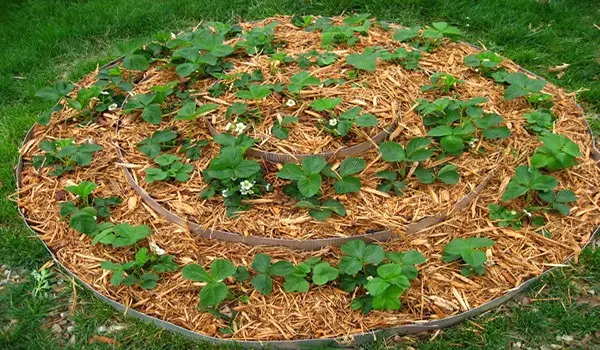
Before planting strawberries, the soil must be prepared, especially if it has not been cultivated before. If the summer resident suspects that May beetle larvae or wireworms may be in the soil, then if possible, it is better to choose another place for planting. Beetle larvae can overwinter in the soil, and one larva is quite capable of destroying a square meter of planting. If it is impossible to choose another piece of land, then experts advise planting alkaloid lupine on the site (the larvae die from eating its beans).
If the result is needed here and now, an ammonia solution is added to the soil. Modern materials greatly facilitate the cultivation of strawberries in the open field. Geotextile, for example, well passes moisture, but does not pass light. And where there is no light, there are no weeds. If the summer resident decides to use it, then he does not need to fight weeds in the fall – it is enough just to crush them so that they rot by spring.
In spring, it is enough to level the bed with a rake, get rid of the largest roots and branches, add compost and spread agrofiber fibers. Make holes in the fiber at a distance of 30 cm from each other and make recesses through them. They need to be watered and the strawberry bush planted carefully. Agrofibre passes moisture well, light does not penetrate through it, therefore, no one will interfere with the growth of strawberries. The summer resident may not think about weeding.
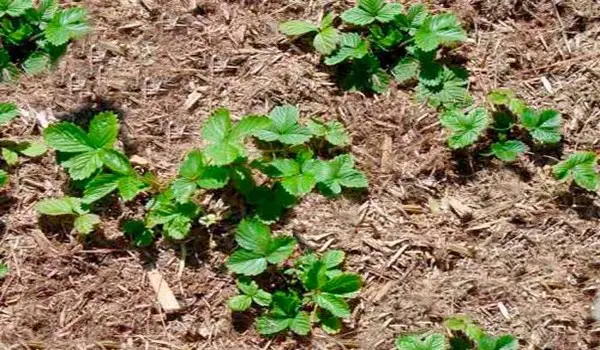
Instead of agrofibre, you can also use a simple roofing material. However, in this case, it is necessary to lay an irrigation system under the roofing material – stretch the hose with stuffed holes (gypsy needle or awl) with a snake. On the one hand, you just need to plug this hose, and on the other, connect a water container, for example, a tank. The roofing material will retain moisture in the soil, so you do not have to water it often.
Selection of planting material
To get a high yield and outwardly attractive berries when grown outdoors, experts recommend choosing elite varieties or first reproductions for planting. When selecting seedlings, it is advisable to buy sorted and pre-healed products.
A fibrous root system with processes of about 8 cm is preferred, the root neck should be at least 6 mm in diameter. You can use your seedlings, having previously dug them up at the end of autumn, subject to successful wintering at low temperatures – that is, store them in the cellar.
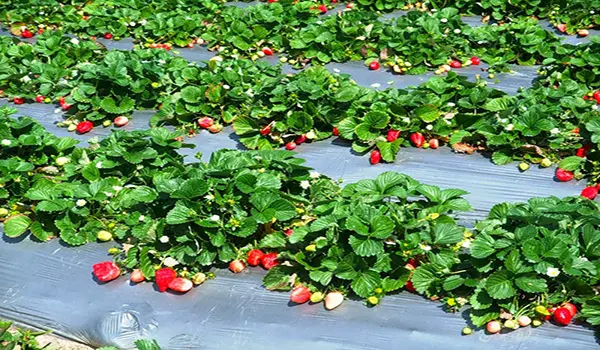
Before planting in open ground, a box with seedlings should be placed in the shade, before that, keep it in a cool place for five days. When planting strawberries in open ground, it is required to ensure that the neck of the bush is at ground level, and the roots are located vertically in the hole. You also need to check the length of the roots and, if necessary, shorten them to 10 cm.
Growing strawberries in the open field
The most successful strawberry berries are laid on the southwestern side, it is desirable that there be a slope of 2-3 degrees: the bushes grow faster and the crop ripens much earlier. It is not recommended to grow strawberries in a lowland. In order for strawberries to grow well in open ground, you should check its acidity: the ideal level is 5,5-6,5.
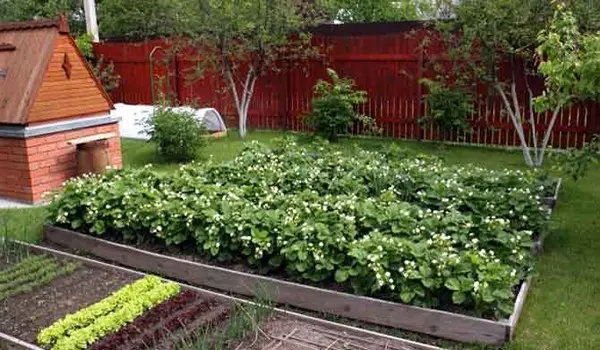
The technology for growing these tasty and sweet berries is usually as follows. Strawberry seedlings are usually planted in open ground in early spring or early autumn. Moreover, in the spring, planting should be carried out as early as conditions allow to start gardening.
If the weather is cool enough, you can cover the bushes with a film. And after establishing a favorable temperature regime, strawberry bushes should be opened. Autumn planting falls on the period from mid-August to the 20th of September.
It is advisable to plant seedlings after rain or watering the soil. The soil should not be very wet, but moist enough. If you plant seedlings in late spring or autumn, then a significant part of it may die.
To get a good harvest of strawberries, growing bushes in open ground, regular watering is necessary, without a long period of overdrying. If proper watering is violated, the yield of strawberries will decrease significantly. For convenience, you can install a drip irrigation system or sprinkler system on the site.
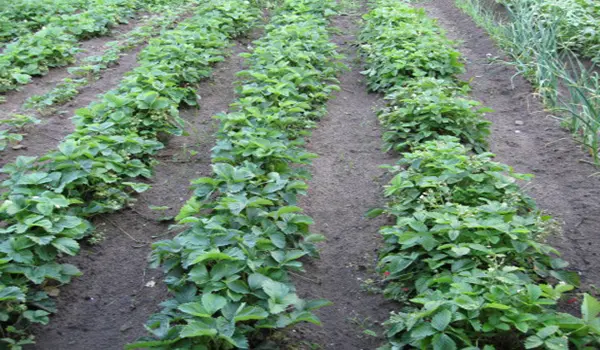
And, of course, it is very important to remove weeds that multiply quite actively in the open field, and to fight pests that can destroy the entire crop and plantings. After planting strawberries, the ground is watered and sprinkled with humus or dry soil in order to retain moisture in the soil for a longer time.
The first couple of weeks after planting the seedlings are the most important – it is imperative to keep the open ground constantly moist. Watering should be daily, so strawberries take root faster. After that, watering is reduced to once every two days.
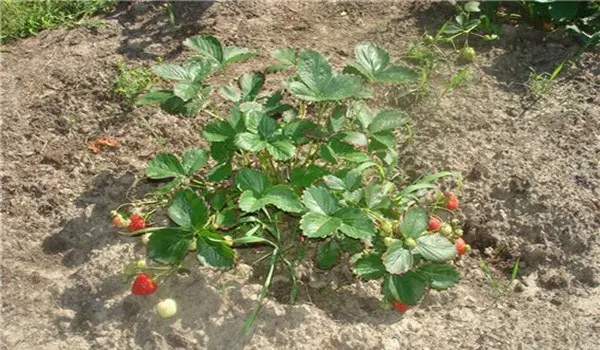
Despite the fact that strawberries love moisture, they should not be heavily flooded – this has a detrimental effect on it – susceptibility to diseases and pests increases (in particular, to powdery mildew, gray rot), its winter hardiness decreases and less generative buds grow (which, as a result, it leads to a decrease in yield; if a summer resident is engaged in the strawberry business, then this is a significant drawback).
Manual weeding, constant control and getting rid of weeds between rows, pest control also has a positive effect on improving the quality and increasing the yield when growing strawberries in open ground.
Video “Planting strawberries in the ground”
Video about the stage of planting strawberries in open ground. Gardening tips for planting and caring for outdoor strawberries.









